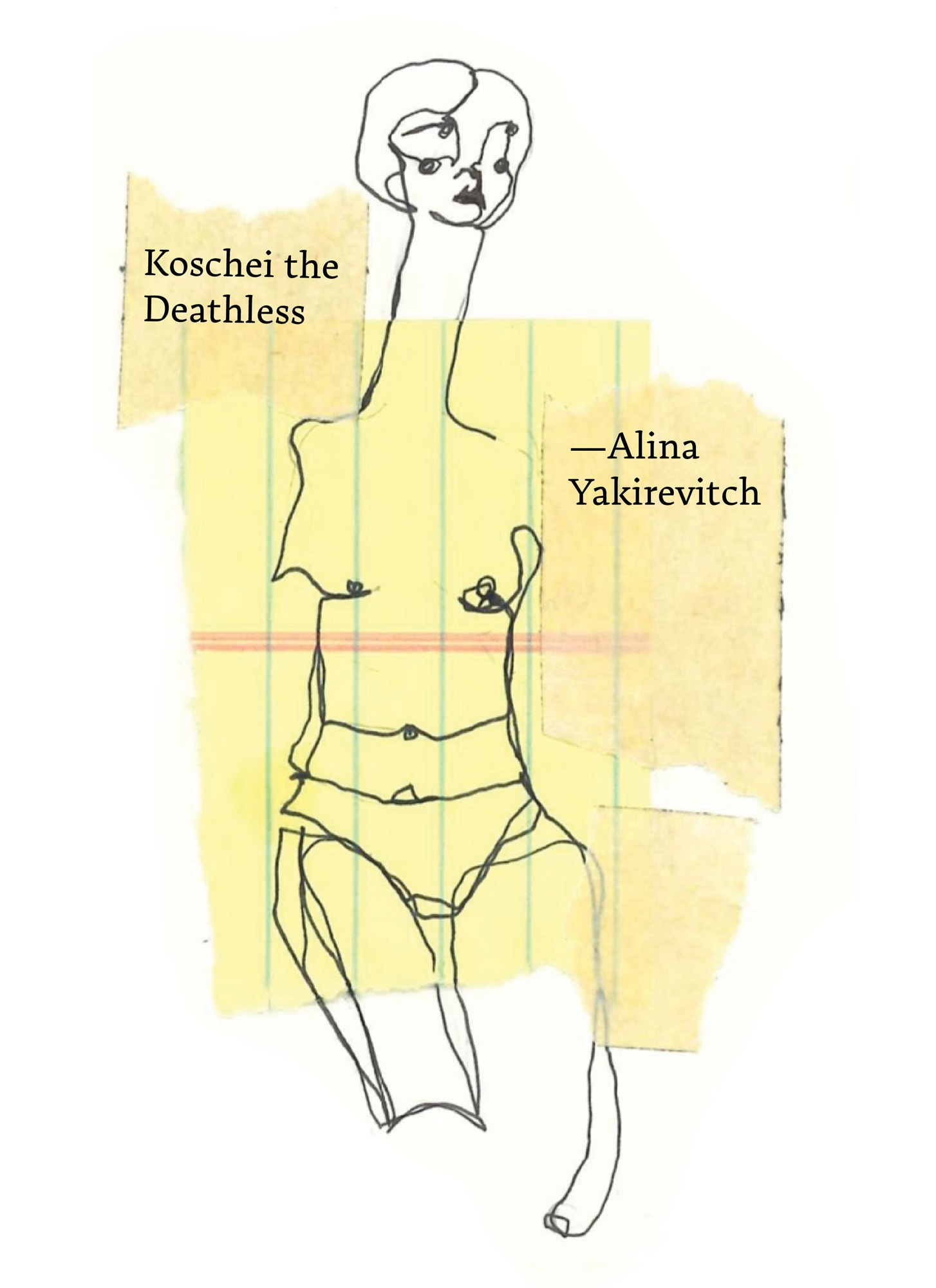Koschei the Deathless

“If you don’t eat, we are going to have a funeral with a small, child-sized coffin,” she says with a mischievous, joyous smile, and I feel fear and a sort of excitement I can’t identify. As a four-year-old immigrant, my appetite was very poor. To be honest, the food itself was uninviting. The only person who was scary enough to make me eat was her. “On Friday she is coming and you’ll see, she’ll make you eat.” I don’t remember her arrival, but I do remember the sense of importance and thrill when walking her to the bus station with my parents, where she left to spend the weekdays in the nursing school.
I suppose that being torn from my birth country and placed in an environment where I didn’t want to be gave birth to this clinging to beauty. Once I found something beautiful, once I got to meet her, it was as if I had found this little gap in the side of the mountain where I could stick my fingers and hold on, tricking myself that if I could hold it well enough, I would be safe from the danger of falling. I want to be clear right away, my commitment was only to beauty.
As with many immigrant families, each apartment doesn’t exactly belong to one nuclear family. People fit in rooms, with a certain principle of convenience, but the calculation is mostly practical. Say there are only two bedrooms, and a living room with a couch. The people present are an old woman, her son, his wife, his brother, and a girl child. In order to avoid the old woman sleeping with one of her sons, either the wife of her son or her granddaughter would sleep in bed with her, and the brothers would sleep side by side. In one of the instances of this body tetris, I ended up having to sleep in bed with her. Her, my father’s cousin.
Falling asleep was out of the question. My heart was racing, I was doing the activity of looking at beauty. She wasn’t falling asleep either. At some point the silence grew too thick. “Are you afraid of me?” That’s clever, I thought. I said yes. “Well, if you are afraid of me I will have to go sleep in the bathtub.” It was a sweet suggestion, it was funny – she was offering to sacrifice something in the name of a child’s night’s sleep. I can’t remember what she eventually did, and no one else does, but this tie between beauty and fear was getting tighter in me, just as my bones were getting longer and stronger.
I loved the stories about premature babies, her deformed patients. “Fairytales are not based on nothing,” she would say, and describe the twisted bodies of all sorts of preemies. The descriptions were terrifying, but the lesson of the stories was that those babies emerge from the state of being misshapen and become healthy, beautiful babies. Her specialty was peeling off the wrinkled skin and revealing the new, perfect form of the very young human, and sending them home in their stunning appearance. Moving tiny living creatures across the border of the frightening and the divine, that was her trade.
A sculpture professor I had used to say that a sculptor knows which materials to use by knowing what she wants to stick her hands in. I can’t say I wanted to stick my hands in my dad’s cousin, but I knew that my desire was a desire towards women by then, when her presence at the table made me eat my chicken soup with devotion. I knew there was no place to set this desire. I also knew that her being fifteen years older than me meant that her pleasure was driven by making me scared and excited, a pleasure planted in a pot that contains a void. “The girl loves you like one loves god,” I hear my mother saying to her. A joke inside of which an unnamed concern is folded. How can a mother say that she sees something tumorous in the intense closeness of her child daughter and her husband’s female relative? How to say the name of what you see?
At a cafe I worked at for years, we had a regular client who is a well known film director. I can only recall one of his films which was released when I was a child. A small boy is stalking his aunt, whose husband was just killed in military combat. In one of the scenes, the boy is hiding by the window of the woman’s room, and catches her masturbating for the first time since her loved one died, gorgeous in her climax. I cheerfully told the director, a humble, charming man, that I admire the script. I love it for biographical reasons, is how I put it. The man smiled warmly, but shared his confusion. “Biographical? Really?” I chose to leave the compliment obscure.
When she was dying, I was the same age she was when we first met. Her daughter was the same age as me. A person too young to be equipped to do the work of mourning. A few hours after her death, her mother held me. “You two were so close. Friends. You were friends.” Friends. She was calling it the wrong name, but you don’t get tedious with a woman who just lost her favorite daughter.
I couldn’t tell anyone that as we were mourning the death of a family member who died very fast and very young, I was mourning the loss of beauty. I couldn’t help but see the decay of the body as a crime of damaging perfection. Her cancer primarily appeared in one of her eyes. I once asked what was wrong with her eye, since it seemed like the pupil had lost the ability to contract. “Oh, I don’t know. Maybe it will kill me.” That was a feeble joke at the time, a joke whose author was unaware of the actual danger. But quickly, the cancer made its way to the liver, a comfortable port from which the rest of the body is easily accessible.
Back to the spoilt beauty. During my visit at her deathbed, I told her, once again, that she was beautiful. Her body was doing things which had no explanation, they seemed unrelated to the illness itself. Symbolic. I remember tiny red dots all over her skin. Why this? It was designed for the eye. With death itself as one of the breathing things present in the room, beauty was the only thing to hold onto.
Alina Yakirevitch is a multidisciplinary artist and writer based in New York. She works in film, installation, sound and sculpture. Alina was born in Russia in the mid 90’s, amidst the transition from failed Communism to radical Capitalism. Awareness of these political systems, the tension between them and the structures of life they dictate, is a core matter in her practice. The recurring experience of an East to West migration, first from Russia to Israel, then from Israel to the US, informs Yakirevitch’s political engagement and her studio practice. Alina holds an MFA from Hunter College and works in education and film production. She writes and publishes fiction and art criticism.
Instagram: @low.rez.cloak
